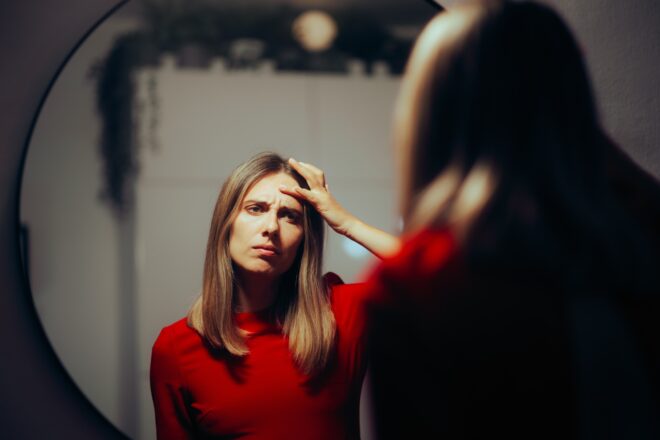Imagine an ordinary morning. You get up, head to the bathroom, and suddenly feel that something has shifted. You can’t quite put your finger on it.
Perhaps it’s a subtle ache in your lower abdomen, or a heavy fatigue you’ve never felt before. Maybe you notice changes when you look in the mirror: fine lines around your eyes, a duller complexion, or a tired expression.
Whether you see visible changes or not, you know with certainty that something is different — and that a transformation is unfolding that cannot be stopped.

Menopause: When does it actually begin?
Menopause is marked by a hormonal shift that can span decades and bring many changes. Most people think first of hot flashes and night sweats. But there are also subtler changes that affect the mind and emotions, gradually shaping everyday life.
The key question remains: when do the menopausal years really begin? The truth is, there is no single answer. The onset varies from person to person and depends on many factors: nutrition, lifestyle, and even past contraception methods. Long-term use of hormonal contraception can delay this transition, while smoking can cause it to start earlier.
That’s why it’s important not only to look at menopause from a scientific or statistical perspective, but also to recognize its different signs and effects on every level.
The beginning of menopause from a scientific perspective
Statistically, menopause begins for most people around the age of 40. This initial stage is called perimenopause. Hormonal changes during this time are gradual and inconsistent, but symptoms may already appear.
The full transition can take up to 13 years. The actual menopause — also called climacteric — is diagnosed only after 12 consecutive months without menstruation. This stage is often accompanied by symptoms such as hot flashes and sweating. After that, the postmenopause begins.
Common signs of menopause
- Sleep problems: frequent waking at night, night sweats, or restless dreams.
- Mood changes or low mood: irritability, sadness, or a sense of emptiness.
- Cardiovascular symptoms: heart palpitations, dizziness, or fluctuations in pulse and blood pressure.
- Cycle changes: heavier or lighter bleeding, irregular intervals.
- Unexplained weight gain: fat accumulation around the belly despite no change in diet, as metabolism shifts.
- Premenstrual-like issues: headaches, back pain, or abdominal cramps.
- Skin and hair changes: drier skin, more visible wrinkles, thinning or increased hair loss.

Facing menopause with resilience from the very start
It isn’t only the biological changes that weigh on you — the shift can also affect your self-image. Perhaps you’ve always felt confident, vibrant, and feminine. But suddenly your body and mind feel different. You begin to question yourself, feel less attractive or less capable, and easily fall into a downward spiral if physical discomforts add to the strain.
That’s why it’s essential to take action early and make the transition as comfortable as possible. Hormone replacement therapy is not the only option. Especially at the start, when the first symptoms appear, gentle and natural companions like menofemme can be a supportive alternative.
menofemme combines ten carefully selected plant extracts designed to help you regain hormonal balance and ease symptoms. Many users report noticeable improvements within 4 to 8 weeks of regular use.
By combining this support with balanced nutrition, regular exercise, and sufficient rest, you can approach this new life stage with calm and confidence.